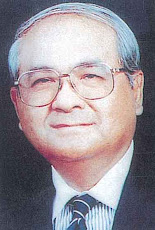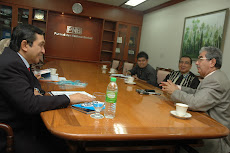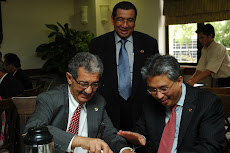THE rising sun brings with it light; it symbolises hope, triumph over darkest times, and something that will advance life. The sun rises in the east for the world, and that is an accepted fact.
However, for Malaysia, it means much more; the sun (and everything it symbolises) rises in the same direction where we found countries and partnerships with what I call synergistic congruence between our business and trade missions.
With over three decades of demonstrated results, the "Look East Policy", or LEP, shares a story of two countries, Malaysia and Japan, that have come a long way towards leveraging respective strengths and establishing bilateral cooperation for mutual progress.
The brainchild of Tun Dr Mahathir Mohamad, the policy was formalised in 1982 with the main objective of increasing the quality of management among the workers, as well as creating a community with good value and positive working ethics with the aim of accelerating Malaysia's development.
However, for Malaysia, it means much more; the sun (and everything it symbolises) rises in the same direction where we found countries and partnerships with what I call synergistic congruence between our business and trade missions.
With over three decades of demonstrated results, the "Look East Policy", or LEP, shares a story of two countries, Malaysia and Japan, that have come a long way towards leveraging respective strengths and establishing bilateral cooperation for mutual progress.
The brainchild of Tun Dr Mahathir Mohamad, the policy was formalised in 1982 with the main objective of increasing the quality of management among the workers, as well as creating a community with good value and positive working ethics with the aim of accelerating Malaysia's development.
The other objectives include undertaking research on, and involving Japan; providing opportunities for greater information exchange and discussion; and disseminating the knowledge gained on Japan to the masses.
For 30 years, LEP worked like a symphony, while we collaborated with Japan, and even South Korea, in concert and in harmony to achieve dramatic progress through meaningful exchange of capital, goods and services, in addition to the valuable insights and work ethics. LEP helped us to capitalise on the power of synergy between two countries.
I, for one, feel very proud to learn that the influence of our strong belief system and culture defines our economic frameworks and their implementation, which again positively affect our national progress.
LEP has been, and will continue, to be instrumental in cross-pollination of such aspects, helping forge new business investments and trade collaborations.
Malaysia and all the proponents of its growth have new hopes after Prime Minister Datuk Seri Najib Razak and Japanese Prime Minister Shinzo Abe agreed to continue strengthening bilateral relations between both countries through the Second Wave of the Look East Policy.
The Second Wave will continue to attract Japanese enterprises to trade and invest in Malaysia under the Malaysia-Japan Economic Partnership Agreement.
More targeted programmes with specific outcome will be developed to support the economic transformation blueprints of both countries, with emphasis on green technology, infrastructure development, Islamic finance and the halal industry.
Undoubtedly, my peers and I who are facilitating various SME development initiatives are looking forward to these new programmes, which will further enhance the progress of our nation's economic transformation.
I am most excited to share that several exchange and study programmes have been successfully undertaken by SME Corp Malaysia as part of the initiatives under the LEP.
The SME@University Programme was initiated based on the training model of SME University of Japan, with the cooperation of the Organisation for Small & Medium Enterprises and Regional Innovation of Japan.
The SME Business Counsellors Training Programme is a collaboration with Japan International Cooperation Agency (Jica).
We are also working with Jica and the Ministry of Foreign Affairs of Japan in organising the Third Country Training Programme for African countries.
This is an exciting time for SMEs and Bumiputera entrepreneurs to identify relevant opportunities and potential in East Asian countries like South Korea, Japan and China.
SME Corp with Perdasama will be organising an interactive "Bicara Petang" with none other than the man who pioneered the concept of LEP for Malaysia, Dr Mahathir, on the topic "Look East Policy - Second Wave: New Reality, Challenges and Opportunities for SMEs".
The programme, scheduled on October 1 in Subang Jaya, aims to provide a platform for Bumiputera entrepreneurs to share their views and opinions, as well as their experience and knowledge with a national role model.
It will also be an opportunity to gain new insights and interpretations of the Second Wave of LEP from Dr Mahathir himself. The session will also bring to the fore new polemics and perspectives on how the SMEs and local entrepreneurs can leverage from the Second Wave.
The Second Wave, just like the first, will further accelerate the development of Malaysia in terms of economics, trade and human capital.
In the past, the Economic Partnership Training Programme under the Economic Partnership Agreement Malaysia-Japan benefited more than 15,000 professionals and technicians in the country. Similarly, in terms of trade, Japan was our third largest trading partner in 2012 with a total trade value of RM145 billion.
Japan was also our largest foreign investor during the 1980-2012 period, with an investment value of RM68.2 billion, creating more than 300,000 jobs.
Our journey continues and the relevance of LEP is only increasing with time, opening up new opportunities with high potential for Malaysia to promote exchange of ideas, knowledge and innovations through greater cooperation with our eastern counterparts. So, when looking at the rising sun, remind yourselves of a whole new world of opportunities in the east, and participate in our national mission to achieve robust growth and a developed nation status by 2020.
Datuk Hafsah Hashim is the chief executive officer of Small and Medium Enterprises Corporation Malaysia (SME Corp Malaysia)
Read more: Rising opportunities for SMEs http://www.btimes.com.my/Current_News/BTIMES/articles/ashim/Article/index_html#ixzz2gMMHXxhS
For 30 years, LEP worked like a symphony, while we collaborated with Japan, and even South Korea, in concert and in harmony to achieve dramatic progress through meaningful exchange of capital, goods and services, in addition to the valuable insights and work ethics. LEP helped us to capitalise on the power of synergy between two countries.
I, for one, feel very proud to learn that the influence of our strong belief system and culture defines our economic frameworks and their implementation, which again positively affect our national progress.
LEP has been, and will continue, to be instrumental in cross-pollination of such aspects, helping forge new business investments and trade collaborations.
Malaysia and all the proponents of its growth have new hopes after Prime Minister Datuk Seri Najib Razak and Japanese Prime Minister Shinzo Abe agreed to continue strengthening bilateral relations between both countries through the Second Wave of the Look East Policy.
The Second Wave will continue to attract Japanese enterprises to trade and invest in Malaysia under the Malaysia-Japan Economic Partnership Agreement.
More targeted programmes with specific outcome will be developed to support the economic transformation blueprints of both countries, with emphasis on green technology, infrastructure development, Islamic finance and the halal industry.
Undoubtedly, my peers and I who are facilitating various SME development initiatives are looking forward to these new programmes, which will further enhance the progress of our nation's economic transformation.
I am most excited to share that several exchange and study programmes have been successfully undertaken by SME Corp Malaysia as part of the initiatives under the LEP.
The SME@University Programme was initiated based on the training model of SME University of Japan, with the cooperation of the Organisation for Small & Medium Enterprises and Regional Innovation of Japan.
The SME Business Counsellors Training Programme is a collaboration with Japan International Cooperation Agency (Jica).
We are also working with Jica and the Ministry of Foreign Affairs of Japan in organising the Third Country Training Programme for African countries.
This is an exciting time for SMEs and Bumiputera entrepreneurs to identify relevant opportunities and potential in East Asian countries like South Korea, Japan and China.
SME Corp with Perdasama will be organising an interactive "Bicara Petang" with none other than the man who pioneered the concept of LEP for Malaysia, Dr Mahathir, on the topic "Look East Policy - Second Wave: New Reality, Challenges and Opportunities for SMEs".
The programme, scheduled on October 1 in Subang Jaya, aims to provide a platform for Bumiputera entrepreneurs to share their views and opinions, as well as their experience and knowledge with a national role model.
It will also be an opportunity to gain new insights and interpretations of the Second Wave of LEP from Dr Mahathir himself. The session will also bring to the fore new polemics and perspectives on how the SMEs and local entrepreneurs can leverage from the Second Wave.
The Second Wave, just like the first, will further accelerate the development of Malaysia in terms of economics, trade and human capital.
In the past, the Economic Partnership Training Programme under the Economic Partnership Agreement Malaysia-Japan benefited more than 15,000 professionals and technicians in the country. Similarly, in terms of trade, Japan was our third largest trading partner in 2012 with a total trade value of RM145 billion.
Japan was also our largest foreign investor during the 1980-2012 period, with an investment value of RM68.2 billion, creating more than 300,000 jobs.
Our journey continues and the relevance of LEP is only increasing with time, opening up new opportunities with high potential for Malaysia to promote exchange of ideas, knowledge and innovations through greater cooperation with our eastern counterparts. So, when looking at the rising sun, remind yourselves of a whole new world of opportunities in the east, and participate in our national mission to achieve robust growth and a developed nation status by 2020.
Datuk Hafsah Hashim is the chief executive officer of Small and Medium Enterprises Corporation Malaysia (SME Corp Malaysia)
Read more: Rising opportunities for SMEs http://www.btimes.com.my/Current_News/BTIMES/articles/ashim/Article/index_html#ixzz2gMMHXxhS


































No comments:
Post a Comment